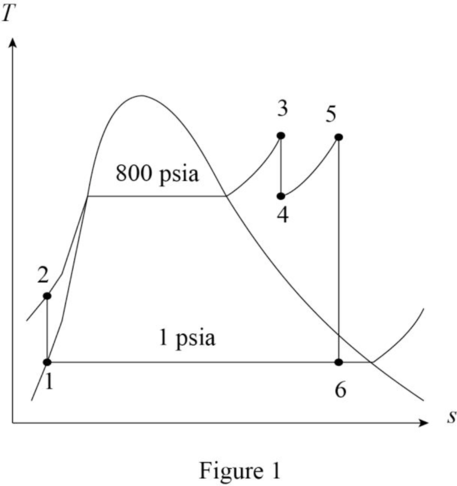
a)
The pressure at which the reheating takes place.
a)
Explanation of Solution
Given:
Pressure of steam at state 3
Pressure of steam at state 1
Temperature of steam at the state 3
Temperature of steam at the state 5
Temperature of steam at the condenser
Rate of heat input
Calculation:
Draw the

The entropies are constant for the process 3 to 4 and process 5 to 6.
Refer Table A-5E, “Saturated water-Pressure table”, obtain the specific enthalpy, temperature and specific volume at state 1 corresponding to the pressure of
Calculate the work done by the pump during process 1-2
Calculate the specific enthalpy at state 2
Refer Table A-6E, “Superheated water”, obtain the specific enthalpy and specific entropy at state 3 corresponding to the pressure of
Refer Table A-5E, “Saturated water-Pressure table”, obtain the pressure at state 4 corresponding to the specific entropy of
Thus, the pressure at which the reheating takes place is
b)
The thermal efficiency of the cycle.
b)
Explanation of Solution
Calculation:
Refer Table A-6E, “Superheated water”, obtain the specific enthalpy and specific entropy at state 5 corresponding to the pressure of
Refer Table A-5E, “Saturated water-Pressure table”, obtain the following properties corresponding to the pressure of
Calculate the quality of steam at state 6
Calculate the specific enthalpy at state 6
Calculate the thermal efficiency of the cycle
Thus, the thermal efficiency of the cycle is
c)
The minimum mass flow rate of the cooling water.
c)
Explanation of Solution
Calculation:
Calculate the rate of heat output from the cycle
Calculate the minimum mass flow rate of the cooling water
Thus, the minimum mass flow rate of the cooling water is
Want to see more full solutions like this?
Chapter 9 Solutions
FUND. OF THERMAL-FLUID SCI (LL) W/ CONN
 Elements Of ElectromagneticsMechanical EngineeringISBN:9780190698614Author:Sadiku, Matthew N. O.Publisher:Oxford University Press
Elements Of ElectromagneticsMechanical EngineeringISBN:9780190698614Author:Sadiku, Matthew N. O.Publisher:Oxford University Press Mechanics of Materials (10th Edition)Mechanical EngineeringISBN:9780134319650Author:Russell C. HibbelerPublisher:PEARSON
Mechanics of Materials (10th Edition)Mechanical EngineeringISBN:9780134319650Author:Russell C. HibbelerPublisher:PEARSON Thermodynamics: An Engineering ApproachMechanical EngineeringISBN:9781259822674Author:Yunus A. Cengel Dr., Michael A. BolesPublisher:McGraw-Hill Education
Thermodynamics: An Engineering ApproachMechanical EngineeringISBN:9781259822674Author:Yunus A. Cengel Dr., Michael A. BolesPublisher:McGraw-Hill Education Control Systems EngineeringMechanical EngineeringISBN:9781118170519Author:Norman S. NisePublisher:WILEY
Control Systems EngineeringMechanical EngineeringISBN:9781118170519Author:Norman S. NisePublisher:WILEY Mechanics of Materials (MindTap Course List)Mechanical EngineeringISBN:9781337093347Author:Barry J. Goodno, James M. GerePublisher:Cengage Learning
Mechanics of Materials (MindTap Course List)Mechanical EngineeringISBN:9781337093347Author:Barry J. Goodno, James M. GerePublisher:Cengage Learning Engineering Mechanics: StaticsMechanical EngineeringISBN:9781118807330Author:James L. Meriam, L. G. Kraige, J. N. BoltonPublisher:WILEY
Engineering Mechanics: StaticsMechanical EngineeringISBN:9781118807330Author:James L. Meriam, L. G. Kraige, J. N. BoltonPublisher:WILEY





